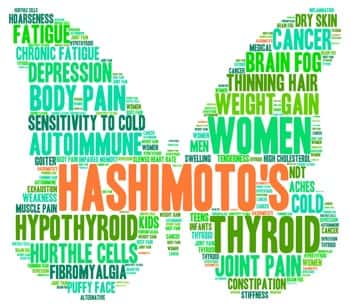
The thyroid gland is small and rather unobtrusive, but its effects are huge. This butterfly-shaped bit of tissue on the front of the neck produces hormones that help set the metabolism of every cell in the body. When the immune system attacks the thyroid gland, the condition is called Hashimoto’s thyroiditis. This is, in fact, the most common cause of hypothyroidism in the US.
Treating Hashimoto’s Thyroiditis:
Q. I have a thyroid condition called Hashimoto’s. My TSH is usually normal but my thyroid antibodies are almost always abnormal in thyroid panel tests.
A year ago, my doctor finally prescribed Synthroid. I consistently had normal tests, but my symptoms got worse. I could not lose weight and my hair was falling out. Although I was depressed and tired, I had problems sleeping. I felt like my brain was in a fog.
Last week my doctor switched me to Armour desiccated thyroid. I am already feeling sharper and more upbeat. My co-workers have asked what’s changed because they’ve noticed the difference as well. Why isn’t Armour used more often?
A. In Hashimoto’s thyroiditis, the immune system attacks the thyroid gland. That explains why your anti-thyroid antibodies have been elevated. (Doctors look for anti-thyroglobulin antibodies, anti-thyroid peroxidase antibodies and TSH receptor antibodies.) As a result, the thyroid gland may lose its ability to produce adequate thyroid hormone.
Inadequate Thyroid Hormone Production:
Doctors usually treat an underactive thyroid gland with synthetic levothyroxine (Synthroid, Levothroid, Levoxyl). This is also called T4. The tissues of the body convert T4 to T3, the active thyroid hormone, when they need it.
Armour and other desiccated thyroid extracts (Nature-Throid, Westhroid) are derived from dried pig thyroid glands. They contain T3 as well as T4, although the ratio differs from that of human thyroids.
Some people do not convert T4 to T3 efficiently. They may feel better on a medication that supplies both hormones. With undertreatment, people may continue to suffer symptoms such as dry skin, cold sensitivity, constipation, fatigue and muscle cramps (ATA/AACE Guidelines, Endocrine Practice, Nov-Dec. 2012).
Many endocrinologists worry, however, that controlling the dose with naturally variable preparations is too difficult. They see desiccated thyroid as antiquated and point out that there are no randomized controlled trials utilizing this thyroid hormone product to treat Hashimoto’s. Other thyroid specialists have called for additional investigation of which patients may benefit from this therapy (Dayan & Panicker, Thyroid Research, Jan. 17, 2018).
You can learn more about levothyroxine and Armour and their use for thyroid problems from our Guide to Thyroid Hormones.

